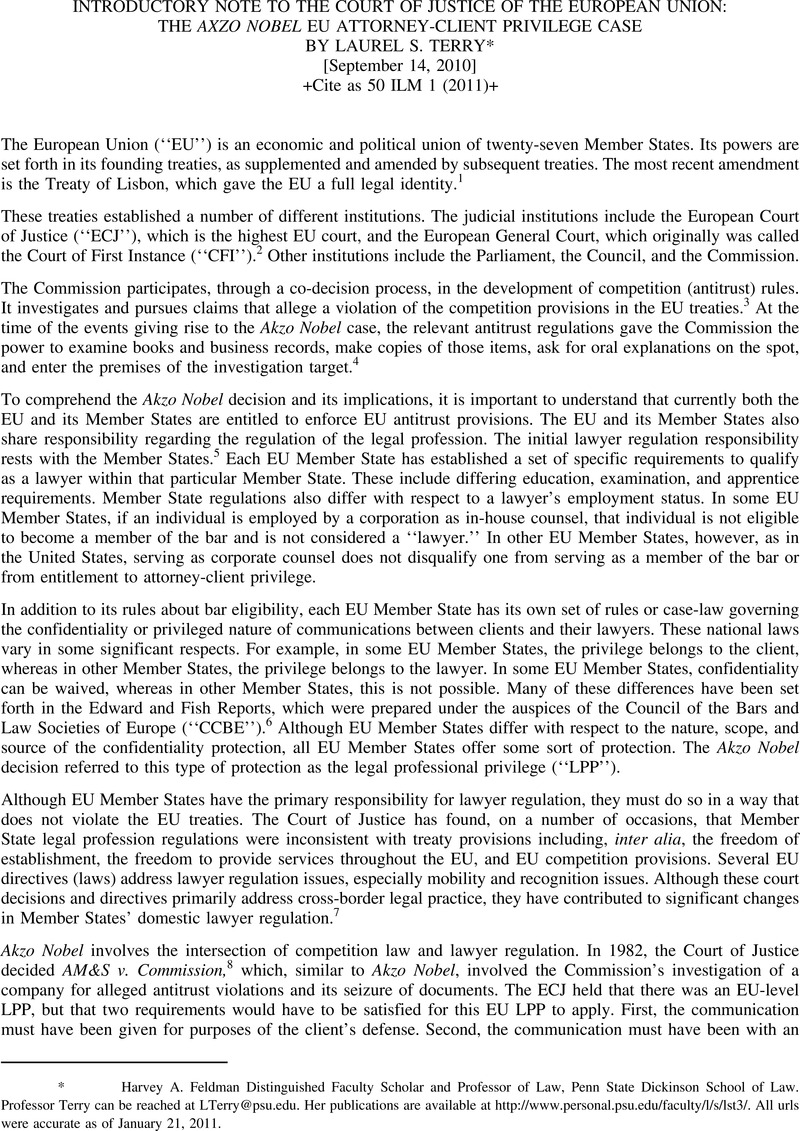Article contents
The Court of Justice of the European Union: The Axzo Nobel EU Attorney-Client Privilege Case
Published online by Cambridge University Press: 27 February 2017
Abstract

- Type
- International Legal Documents
- Information
- Copyright
- Copyright © American Society of International Law 2011
References
End notes
* This text was reproduced and reformatted from the text available at the Court of Justice of the European Union website (visited Jan. 31, 2011) http://curia.europa.eu/jurisp/cgi-bin/form.pl?lang=EN&Submit=rechercher&numaff=C-550/07.
1 See About the European Union, Europa, http://europa.eu/about-eu/index_en.htm(last visited Jan. 21, 2011).
2 See, e.g., EU courts, E-Justice, https://e-justice.europa.eu/contentPresentation.do?idTaxonomy=15&lang=en&vmac=aEfWOmTTcGxsG9ktvfBP6tzjZ750h-jdlKaMdTlxWZJRiyK6VlssZnXzABlCRbeq5GBzIHJF1TmpDQhrINDQVQAAJH8AAAGy (last visited Jan. 21, 2011).
3 See Consolidated Version of the Treaty on the Functioning of the European Union arts. 3, 105, Sept. 5, 2008, 2008 O.J. (C 115) 47 [hereinafter TFEU].
4 See Case C-550/07 P, Akzo Nobel Chems. Ltd. v. Comm’n, nn.8-9 and accompanying text (Sept. 14, 2010), available at http://curia.europa.eu/jurisp/cgi-bin/form.pl?lang=EN&Submit=rechercher&numaff=C-550/07; Court Proceedings, Nov. 6, 2010, 2010 O.J. (C 301) 2, available at http://curia.europa.eu/jurisp/cgi-bin/form.pl?lang=EN&Submit=rechercher&numaff=C-550/07 [hereinafter Akzo Nobel].
5 See Laurel, S. Terry, The European Commission Project Regarding Competition in Professional Services, 29 Nw. J. Int’l L. & Bus. 1, 11-13, 16-20 (2009).Google Scholar
6 John Fish, Regulated Legal Professionals and Professional Privilege Within the European Union, the European Economic Area and Switzerland, and Certain other European Jurisdictions (Feb. 27, 2004), available at http://www.ccbe.eu/fileadmin/user_upload/NTCdocument/fish_report_enpdf1_1184145269.pdf; D.A.O. Edward, Report on the Professional Secret, Confidentiality and Legal Professional Privilege in the Nine Member States of the European Community (Oct. 1976), available at http://www.ccbe.eu/fileadmin/user_upload/NTCdocument/edward_enpdf1_1182334460.pdf; see also Council of Bars and Law Societies of Europe [CCBE], Update of the Edward’s Report on the Professional Secret, Confidentiality and Legal Professional Privilege in Europe (Sept. 2003), available at http://www.ccbe.eu/fileadmin/user_upload/NTCdocument/update_edwards_repor1_1182333982.pdf.
7 See CCBE, Free Movement of Lawyers Committee, http://www.ccbe.eu/index.php?id=94&id_comite=8&L=0 (includes a list of EU cases and links to the relevant directives); see also Terry, supra note 5; Laurel S. Terry, The Bologna Process and Its Impact in Europe: Much More Than Degree Changes, 41 Vand. J. Transnat’l L. 107, 147-52 (2008) (discussing these developments).
8 Case 155/79, AM & S v. Comm’n, 1982 E.C.R. 1575.
9 Case 85/79/EEC, Commission Decision of 14 December 1984 Relating to a Proceeding under Article 85 of the EEC Treaty (John Deere Ltd.) Common Mkt. Rep. (CCH) ¶ 10,652, 1985 O.J. (L 35) 58.
10 The contract between Akzo and its in-house counsel specifically acknowledged the in-house counsel’s freedom and independence. Under Dutch law, this agreement and the lawyer’s status as a member of the bar meant that Dutch LPP applied. See Akzo Nobel, supra note 4, ¶¶ 34-36; Advocate General Opinion, infra note 13, ¶¶ 63-64, 103.
11 See Joined Cases T-125/03 & T-253/03, Akzo Nobel Chems. Ltd., Akcros Chems. Ltd. v. Comm’n, Judgment of the Court of First Instance (First Chamber, Extended Composition) of Sept. 17, 2007, O.J. C 269/43 (Nov. 10, 2007). Additional information is available on the Curia website, http://curia.europa.eu/jurisp/cgi-bin/form.pl?lang=EN&Submit=rechercher&numaff=T-125/03. At the time the lower court’s decision was issued, the court was known as the Court of First Instance. The Akzo Nobel decision refers to the lower court by its new name, which is the General Court.
12 See Terry et al., Transnational Legal Practice: 2008 Year-in-Review, 43 Int’l L. 943, 956-57 (2009); Advocate General Opinion, infra note 13, ¶ 28.
13 Opinion of Advocate General Kokott, Case C 550/07 P, Akzo Nobel Chems. Ltd. & Akcros Chems. Ltd. v. Comm’n (Apr. 29, 2010), http://curia.europa.eu/jurisp/cgi-bin/form.pl?lang=EN&Submit=rechercher&numaff=C-550/07 [hereinafter Advocate General Opinion]. This introductory note does not provide a thorough review of the Advocate General’s Opinion, which was 198 paragraphs long with 138 footnotes. The Advocate General’s Opinion addressed a number of interesting points that were not included in the Court’s decision, including the effect of the lawyers Establishment Directive 98/5, the Financial Action Task Force recommendations, and the European Court of Human Rights’ jurisprudence.
14 Akzo Nobel, supra note 4, ¶ 115.
15 See Advocate General Opinion, supra note 13, ¶ 189 (“Even if – contrary to the solution which I have proposed – legal professional privilege were to be extended to internal company or group communications with in-house lawyers who are members of a Bar or Law Society within the European Economic Area, the inclusion, in addition, of lawyers from third countries would not under any circumstances be justified.”). Read in context, however, this language seems limited to in-house counsel from third countries, rather than independent lawyers from third countries. Paragraph 190, on the other hand, included the following language which bodes poorly for the recognition of LPP by independent third country lawyers:
[U]nlike in the relationship between the Member States, in the relationship with third countries there is, generally speaking, no adequate basis for the mutual recognition of legal qualifications and professional ethical obligations to which lawyers are subject in the exercise of their profession. In many cases, it would not even be possible to ensure that the third country in question has a sufficiently established rule-of-law tradition which would enable lawyers to exercise their profession in the independent manner required and thus to perform their role as collaborators in the administration of justice. It cannot be the task of the Commission or the Courts of the European Union to verify, at considerable expense, that this is the case on each occasion by reference to the rules and practices in force in the third country concerned, particularly since there is no guarantee that there will be an efficient system of administrative cooperation with the authorities of the third country on every occasion.
See also AM&S, 1982 E.C.R. ¶ 3 (“The protection thus afforded must apply without distinction to any lawyer entitled to practise his profession in one of the member states, regardless of the member state in which the client lives.); id. ¶ 24 (noting that the requirement of an independent lawyer reflects the legal traditions common to Member States, the statutes of the Court of Justice of the EEC and the EAEC and the Court of Justice of the ECSC) (emphasis added).
- 1
- Cited by




